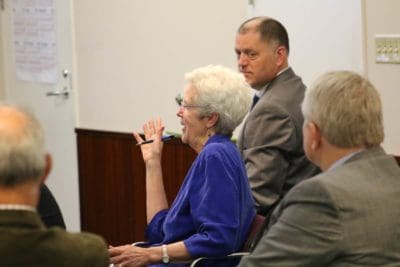
New testing guidance came from the state Department of Public Instruction (DPI) late last week, and it looks like it will be business as usual at the end of the first semester for high school students and some middle school students. That means in-person testing.
Last spring, the state received waivers from the federal and state government for required standardized testing because of COVID-19, but so far this year, that flexibility isn’t forthcoming. According to DPI, districts will have to administer their End-of-Course (EOC) tests and Career and Technical Education (CTE) assessments in December and January. And it cannot be done remotely.
These tests account for at least 20% of students total grade, and federal law requires that 95% of students take them, leading some superintendents and principals to worry about the feasibility of what they are being asked to do amid a pandemic. In addition, these tests help determine school performance grades, evaluate teachers, and determine principal salary, all of which Principal Tabari Wallace thinks is problematic.
“Our school right now is going to be judged. We’re going to have a letter grade on our school and we have probably the biggest gap in learning we’ve ever had thanks to COVID,” he said.
Wallace, a former state Principal of the Year and the leader of West Craven High School in Craven County, said the problems with this situation are numerous.
First, he said that parents who are choosing to have their kids learn fully remotely were essentially promised that their children would never have to set foot in a school building during this pandemic.
“Now, at this late date, I’m going to have to tell them you’re going to have to come to school,” he said.
Wallace said that teachers are concerned because students haven’t really had “traditional” instruction in school since last March. And now they’re being asked to take a traditional test as though everything is normal.
And then, from an administrator’s point of view, there is just the challenge of getting students into buildings to test them. Typically, Wallace said it takes one teacher and one proctor to administer 30 tests. Now, because of social distancing, three teachers will be needed to administer those same 30 tests. And that’s just one of the challenges.
“It’s going to be a logistical nightmare to make it happen,” Wallace said.
The DPI guidance, which was addressed as being from State Board of Education Chair Eric Davis to district superintendents and charter school leaders, essentially said that the state’s hands are tied by the federal government.
“In a letter dated September 3, 2020, U.S. Department of Education Secretary Betsy DeVos intentions informed the Department of Public Instruction (DPI) that the federal government did not intend to waive the required statewide assessments, including general assessments and alternate assessments, or the accountability reports for the 2020–21 school year,” the guidance states. “Unless there is a change in that direction, we are required to move forward with testing and accountability despite the difficulties and challenges that are created by the COVID-19 pandemic.”
The document also says that the tests are required by state law and “there has been no indication the North Carolina General Assembly will waive or modify the law.”
The document goes on to say that the state explored the possibility of having the exams administered remotely but that this “may compromise the validity and reliability of the test data. Additionally, inconsistent access to the test and the administration procedures would yield inequities in the students’ experiences. These differences could skew any outcomes, misrepresenting student performance, achievement, and growth analyses. Also, results may not be valid for Read to Achieve, School Performance Grades, EVAAS growth analyses, and the Every Student Succeeds Act. For these reasons, remote test administrations unfortunately are not feasible.”
A new United States secretary of education will be nominated by President-elect Joe Biden in 2021, and that could mean a different approach to federal waivers for state testing in the spring. But for now, superintendents like Don Phipps, the leader of Caldwell County Schools, are having to think through the challenges that lay just weeks in the future.
The EOC tests coming up at the end of first semester, primarily for high school students, are in math 1, math 3, English II, and biology. And then there are also the CTE State Assessments. The tests will be taken in either December or January, depending on when the fall semester ends in a district.
Phipps said one of his big concerns is being able to adhere to the federal rule that 95% of students take the exams. That’s a concern also shared by Travis Reeves, superintendent of Surry County Schools.
They say that it’s going to be hard to get all those students into buildings to take the test when so many have opted for remote learning out of concerns over COVID-19. They also both question whether the results from the tests will actually yield meaningful data.
“If you know it’s flawed, then why would you use it?” Phipps asked.
“Is it realistic to think that the results we’re going to gain on this year’s testing will be valid and reliable?” Reeves asked.
Another concern of Reeves’ is the window in which students will be taking these tests. Ordinarily, students must take these tests in the last five days of a semester. But given everything going on, the DPI guidance says that districts that need additional days can do so using the “Testing Outside the Window process.”
Reeves said that while that may be necessary, it also causes unintended side effects.
“If you extend that testing window beyond, then you certainly take instruction away from students,” he said.
Matt Wight, principal at Apex Friendship High School in Wake County Public Schools, said he is particularly worried about those students who aren’t doing well when it comes to testing.
According to Keung Hui, a reporter from the News & Observer, the percentage of Wake County middle and high schools students failing this year is up 10 percentage points from last year.
“Probably the group we worry about the most are those students who have been unsuccessful in remote learning who are not engaged in remote learning and the concern is … we don’t think those kids are going to show,” Wight said.
If a student doesn’t think he or she is likely to improve their grade much by taking one of these tests, they might skip altogether, Wight said. At 20% of a total grade, doing badly on these tests or skipping them could have grave consequences for students.
“We’re looking at potentially a tidal wave of failures,” Wight said.
Wight said he is working in his school on remediation efforts with some students who haven’t been engaged. He said his school has started bringing small groups of students into the building to help them get “traction” in their courses.
“The biggest leverage is going to be that they feel like they have a chance to pass a course,” he said.
Wight also said his school has started bringing in freshman and new students just so they can get to know the school. Otherwise, the first time they came into the building would be to take a high-stakes exam.
For Phipps and Reeves, these issues with testing highlight a problem that is bigger than the pandemic. They want to see a change in the way the state does testing altogether.
Phipps, along with other superintendents in the northwest part of the state, sent a letter out to a slew of people in late August asking for testing reform. It went to members of the State board of Education, all lawmakers in the legislature, the two candidates for state Superintendent of Public Instruction, and others.
The letter states many common concerns related to standardized testing in North Carolina, including that the tests are administered at the end of courses or the end of the year and thus are not useful to a teacher trying to use the results for instructional purposes going forward. Furthermore, the letter talks about how the tests represent only one day in a students’ life and cause a great deal of anxiety. The letter also argues that the tests students currently have to take aren’t even adequate for showing whether a student has mastered a subject or not. See more in the letter below.
Phipps said the letter was actually drafted back in March before the pandemic took off but wasn’t sent out until this school year because of concern it would get lost in the shuffle of COVID-19 challenges.
“Those of us who are living it realize we’ve got some problems that need to be addressed,” Phipps said.
Reeves agrees that it is time to think about both short-term and long-term changes to testing in the state.
In the short-term, he said that testing needs to be detached from some of the consequences it helps determine, like principal salaries and teacher accountability. He said that for now, social and emotional well-being are the priority.
“Until we know the students social and emotional needs are met, we have to put those two things first before the academic needs. Because those social and emotional pieces are so important, and I think the pandemic has uncovered that also,” he said.
Long-term, he said changes are necessary, too.
“I think … that we’ve got to look at our testing and accountability model and it should match the instructional model in our schools,” he said, adding later: “I think it’s time that we reevaluate the way we test our students.”
For the time being, testing will go on as usual. Wallace, the principal in Craven County, said that he doesn’t blame the state for what’s happening. When the federal government grants a testing waiver, that’s when it will be up to state legislators, DPI, and the State Board to act, he said.
“I believe in accountability,” said Wallace. “I just don’t believe in accountability when it’s unbalanced and unfair.”




